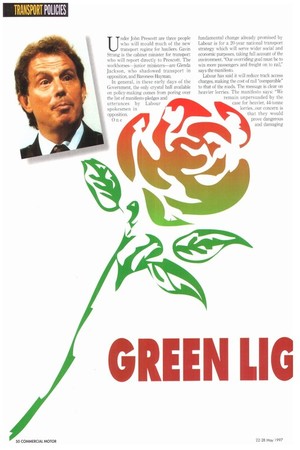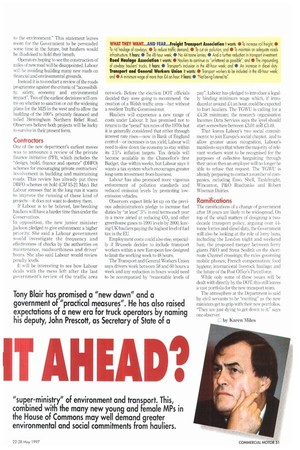U rider John Prescott are three people who will mould much
Page 52

Page 53

If you've noticed an error in this article please click here to report it so we can fix it.
of the new transport regime for hauliers. Gavin Strang is the cabinet minister for transport who will report directly to Prescott. The workhorses—junior ministers—are Glenda Jackson, who shadowed transport in opposition, and Baroness Hayman.
In general, in these early days of the Government, the only crystal ball available on policy.making comes from poring over the list of manifesto pledges and utterances by Labour spokesmen in opposition.
One fundamental change already promised by Labour is for a 20-year national transport strategy which will serve wider social and economic purposes, taking full account of the environment. "Our overriding goal must be to win more passengers and freight on to rail," says the manifesto.
Labour has said it will reduce track access charges, making the cost of rail "comparable" to that of the roads. The message is clear on heavier lorries. The manifesto says: "We remain unpersuaded by the case for heavier, 44-tonne lorries...our concern is that they would prove dangerous and damaging to the environment." This statement leaves room for the Government to be persuaded some time in the future, but hauliers would be ill-advised to hold their breath.
Operators hoping to see the construction of miles of new road will be disappointed. Labour will be avoiding building many new roads on financial and environmental grounds.
Instead it is to conduct a review of the roads programme against the criteria of "accessibility, safety, economy and environmental impact". Two of the earliest decisions will centre on whether to sanction or cut the widening plans for the M25 in the west and to allow the building of the 100% privately financed and tolled Birmingham Northern Relief Road. Observers believe both projects will be lucky to survive in their present form.
Contractors One of the new department's earliest moves was to announce a review of the private finance initiative (PFI), which includes the "design, build, finance and operate" (DBFO) schemes for encouraging private contractors' involvement in building and maintaining roads. This review has already put three DBFO schemes on hold (CM 15-21 May). But Labour stresses that in the long run it wants to improve the running of these kind of projects--it does not want to destroy them.
If Labour is to be believed, law-breaking hauliers will have a harder time than under the Conservatives.
In opposition, the new junior minister Jackson pledged to give enforcement a higher priority. She said a Labour government would investigate the frequency and effectiveness of checks by the authorities on maintenance, roadworthiness and driver' hours. She also said Labour would review penalty levels.
It will be interesting to see how Labour deals with the mess left after the last government's review of the traffic area network. Before the election DOT officials decided they were going to recommend the creation of a Welsh traffic area—but without a resident Traffic Commissioner.
Hauliers will experience a new range of costs under Labour. It has promised not to return to the "penal" tax rates of the 1970s but it is generally considered that either through interest rate rises—now in Bank of England control—or increases in tax yield, Labour will need to slow down the economy to stay within its 25% inflation targets. Tax details will become available in the Chancellor's first Budget. due within weeks, but Labour says it wants a tax system which encourages greater long-term investment from business.
Labour has also promised more vigorous enforcement of pollution standards and reduced emission levels by promoting lowemission vehicles.
Observers expect little let-up on the previous administration's pledge to increase fuel duties by "at least" 30•0 in real terms each year in a move aimed at reducing CO, and other greenhouse gases to 1990 levels by 2000, leaving UK hauliers paying the highest level of fuel tax in the EU.
Employment costs could also rise, especially if Brussels decides to include transport workers within a new European law designed to limit the working week to 48 hours.
The Transport and General Workers Union says drivers work between 58 and 60 hours a week and any reduction in hours would need to be accompanied by "reasonable levels of pay". Labour has pledged to introduce a legally binding minimum wage which, if introduced at around LI an hour, could be expected to hurt hauliers. The TGWU is calling for a £4.38 minimum; the research organisation Incomes Data Services says the level should start somewhere between £3.01 and £3.49.
That leaves Labour's two social commitments: to join Europe's social chapter, and to allow greater union recognition. Labour's manifesto says that where the majority of relevant workers want to be recognised for the purposes of collective bargaining through their union then an employer will no longer be able to refuse that request. The TGWU is already preparing to contact a number of companies, including Esso, Shell, Tankfreight, Wincanton, P&O Roadtanks and Robert Wiseman Dairies.
Ramifications The ramifications of a change of government after 18 years are likely to be widespread. On top of the small matters of designing a twodecade transport policy, arguing over 44tonne lorries and diesel duty, the Government will also be looking at the role of lorry bans, including the London night and weekend ban; the proposed merger between ferry giants P&O and Stena Sealink on the shortroute Channel crossings; the rules governing mobile phones; French compensation; food hygiene; international livestock haulage; and the future of the Post Office's Parcelforce.
While only some of these issues will be dealt with directly by the DOT, this still leaves a vast portfolio for the new transport team.
The atmosphere at the Department is said by civil servants to be "exciting" as the new ministers get to grip with their new portfolios. "They are just dying to get down to it," says one observer.
E by Karen Miles
















































































































